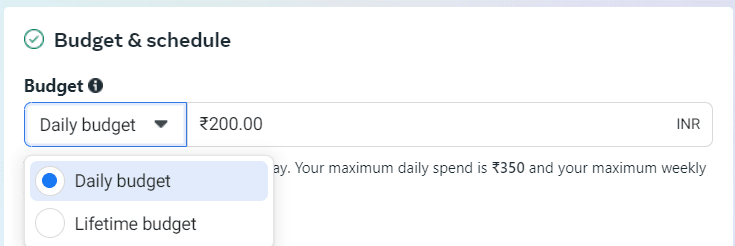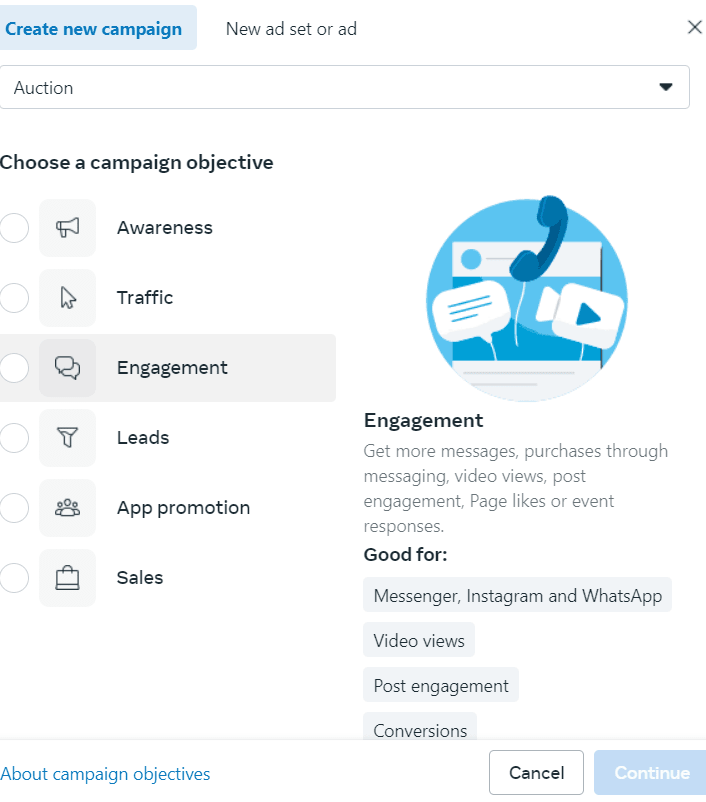Yes, the answer is should you run Facebook ads for longer than a week? because when we plan Facebook marketing, the most crucial point is the period of running an Ad. The time to run a Facebook ad significantly impacts the performance and audience impression, influencing the audience, engagement, cost-effectiveness, and overall. Running a short period of the ad will prevent the best outcome, while a prolonged campaign can risk audience fatigue and diminishing returns. So, Let’s find out.
What is the common Debate about Running Facebook Ads?
Marketers often debate on the part that a short duration of running ads is great because of the engagement, it’s less risky and doesn’t make the audience tired. When another debate is there the longer the duration of the ad is the broader and the more information you can of your audience. The results will be more optimized, have sustained visibility, and be more aware. So this debate is not one fit answer from many experts.
So for that reason, it’s necessary to highlight the importance of making informed decisions about whether we should run Facebook ads for longer than a week.
The Facebook Ad Lifecycle:
Learning Phase:
When you run a Facebook ad it goes to the learning phase. This is the first stage. During this stage, the Facebook algorithm works to optimize the targeted audience that will interact with your ad. The goal is the identify which segment of the audience is going to be more engaged and convert as per your objective.
Typically this learning phase requires about 50 times optimization events like clicks, conversions, or specific actions within a week. In this time frame, you can see fluctuations in performance metrics as the algorithm refines its approach. It’s important not to make significant changes while your ad is in this phase or else it will be delayed in achieving the optimal performance.
Once the learning phase is complete, the ad transition transfers to the performance stage, where it should ideally perform at its best. Understanding this phase is crucial because it informs how long you should run the ad before making any adjustments and extending the duration of the ads.
Ad Fatigue and Saturation
While we are in the learning phase it is critical to optimize, running an ad that runs for so long because running an ad for too long can create fatigue among the audience. Ad fatigue is where one ad is shown by one person multiple times. By that the audience started to ignore it and that turned out to bad performance or not getting the desired action.
To counteract we have to see the performance through key performance indicators such as click-through rate. If the metrics are going slightly low then we have to understand that the audience interest is decreasing. By considering that we have to change the creatives and ad copy or we have to push the ad temporarily to refresh the interest.
Frequently changing the ad’s visuals, copy, headlines, and call to action can help to maintain audience engagement and prevent the negative effect of ad fatigue. Additionally, you can use A/B testing to see what kind of ad your audience likes the most and which allows your ad to be optimized more according to your audience.
By understanding the learning phase and being proactive about managing ad fatigue you can run your ad smoothly and also reach your target audience.
Factors Influencing Ad Duration:
Budget Considerations:
Budget plays a key role in determining whether Should you run Facebook ads for longer than a week. The amount allocated for a campaign can affect its performance and overall effectiveness. When we run an ad with a smaller amount it’s difficult to reach the target audience in a shorter time. Conversely, when we are investing a hefty amount to run an ad it gives us a quick result but at a risk of saturating with a larger audience while they can feel an ad fatigue.

Optimizing Budget Allocation:
For a longer campaign consider the budget by seeing the result of the campaign. If a campaign is doing good you can extend the budget as per your choice. Likewise, if you see your ad’s performance is dropping then you can deduct the budget or you can pause the Ads. Keeping an eye on your key performance indicators like click-through rate and ROAS(Return on Ad Spent) can tell you what you need to do and how many days you need to run the Ad.
Audience Size and Frequency:
Audience size is another key factor in knowing how long the ad can run. If your audience is small and you are running an ad. Then your ad can shown by one person multiple times as your audience is small which makes them ad fatigued. They will ignore and lose interest. If you have a larger audience then you can target more audiences and new audiences to show your ad without oversaturation.
- Ad Frequency: This refers to how often a person sees your ad. The frequency should be between 1.5 to 3. If it exceeds this, then it will create ad fatigue and the audience will lose interest or they will be too familiar with your ad. So, by checking the ad frequency you can see how many times you have to change the audience targeting.
Campaign Objectives :
Your objective of the campaign can greatly impact how many days your campaign should run. If it’s awareness, lead generation, or engagement it has some varying timeline to see the great results. So when you doubt whether Should you run Facebook ads for longer than a week? These are what you should know about it.

Awareness Campaigns:
An awareness campaign means when your brand is trying to reach out to more customers. So it runs for a longer period. A steady long-term approach can be great for your brand to be recognized by a wider audience at an awareness campaign.
Consideration Campaigns:
This is a campaign where you gain engagement, and traffic from your audience to your website or specific landing page. This duration can be medium-term, These ads run for a long time to engage with users meaningfully without oversaturating them.
Conversion Campaigns:
Conversion campaigns are those that run for a short time to convince people to buy. If you have any offers for a specific period you can run this ad, If you are seeing great results you can extend time and budget accordingly.
Best Practices for Ad Duration:
Before fully committing to a long run ad campaign it is essential to test ad sets running a short period. By running an ad for 3-5 days first to see whether it’s working well or not. The metrics you have to check are click-through rate, ROAS, cost per click, and conversion, By seeing these you can figure out how to run an ad in the long term. If it’s not giving you good performance then try to adjust the ad by seeing analytics before spending a large amount of money.
Scheduled Breaks:
Schedules breaks arise when your ad frequency increases and many people see your ads multiple times which gives them ad fatigue. Ad fatigue is generally not good for your business or campaign. Because people get too familiar with your ad and start ignoring it. So sometimes take a scheduled break for 4-5 days or a week. So that you can run your ads and people can take some time to breathe or take a break from your campaign.
You can also rotate the campaign by changing the picture, video, and headline so that people will see your campaign as fresh. The engagement rate also increased when you changed your campaign style every two weeks or so.
When to Extend or Cut Short an Ad Campaign:
Performance Metrics:
Monitoring your key metrics is essential to determine whether to run a campaign for a longer time or cut short the ad campaign. The key metrics are:
- Click-through rate (CTR): When your ad is more engaged by the audience and loved by them that means your campaign is doing great so you can increase some of more days to run the campaign.
- Conversion: When your goal is conversion means you trying to sell, sign up, etc something for your audience. If you see your conversion is good means your product is selling fast through your campaign which means you can increase the days like if you see the conversion is getting low then you can adjust the campaign or stop the campaign for the time being.
- Cost Per Acquisition: Cost per acquisition means how much it costs to acquire a customer, If you see seeing cost per acquisition is under your budget or your target budget then you can add some more budget and time for the campaign. But if it’s increased beyond your budget then you can adjust or stop the campaign.
Market Trends and Seasonality:
Market trends or seasonality plays a huge role in whether to run the ads for less time or whether Should you run Facebook ads for longer than a week. Because when it’s seasonality you know your audience wants to buy your product or service. So that time you can spend a lot on your ad to run a longer period. But when the market is down you don’t need to run a campaign for a longer time.
Just like that when some trends come up relayed to your business you have to understand people will search for your business, And that’s a perfect time to run the ads to attract more audience. But when you are using a trends campaign try to be more creative on your ad because everyone will be focused and you will lost somewhere. For that, you can follow the Facebook Newsletter for more updates.
Conclusion:
Ultimately, there is no one-size-fits-all answer to how long a Facebook ad should run. With proper experimentation with different ad durations, you will get an idea, But yes, it is necessary to run an ad for a longer time to see which kind of audience and what time of ads are working for you. The learning phase is always crucial for everyone. Try to be more patient and more analytically correct at the time of running an ad campaign.
If you are facing any kind of problem running a Facebook ad feel free to reach out to us. By seeing our article you will already get an idea that we just dive into the problem and provide the perfect solution. And if you want to run an ad for a Lawyer or law firm you should read this to gain proper knowledge.


Pingback: Top 10 Effective Strategies to Maximize Your ROI with Social Media Marketing - creativity meets strategy in the digital realm